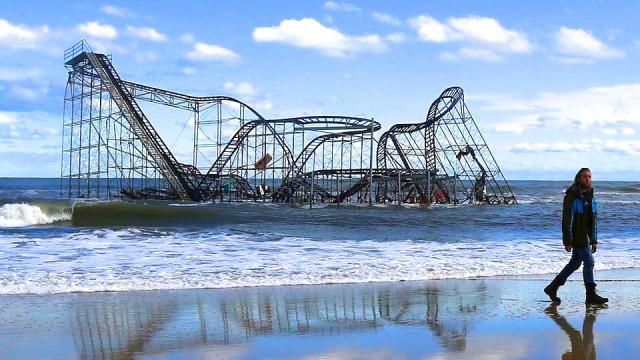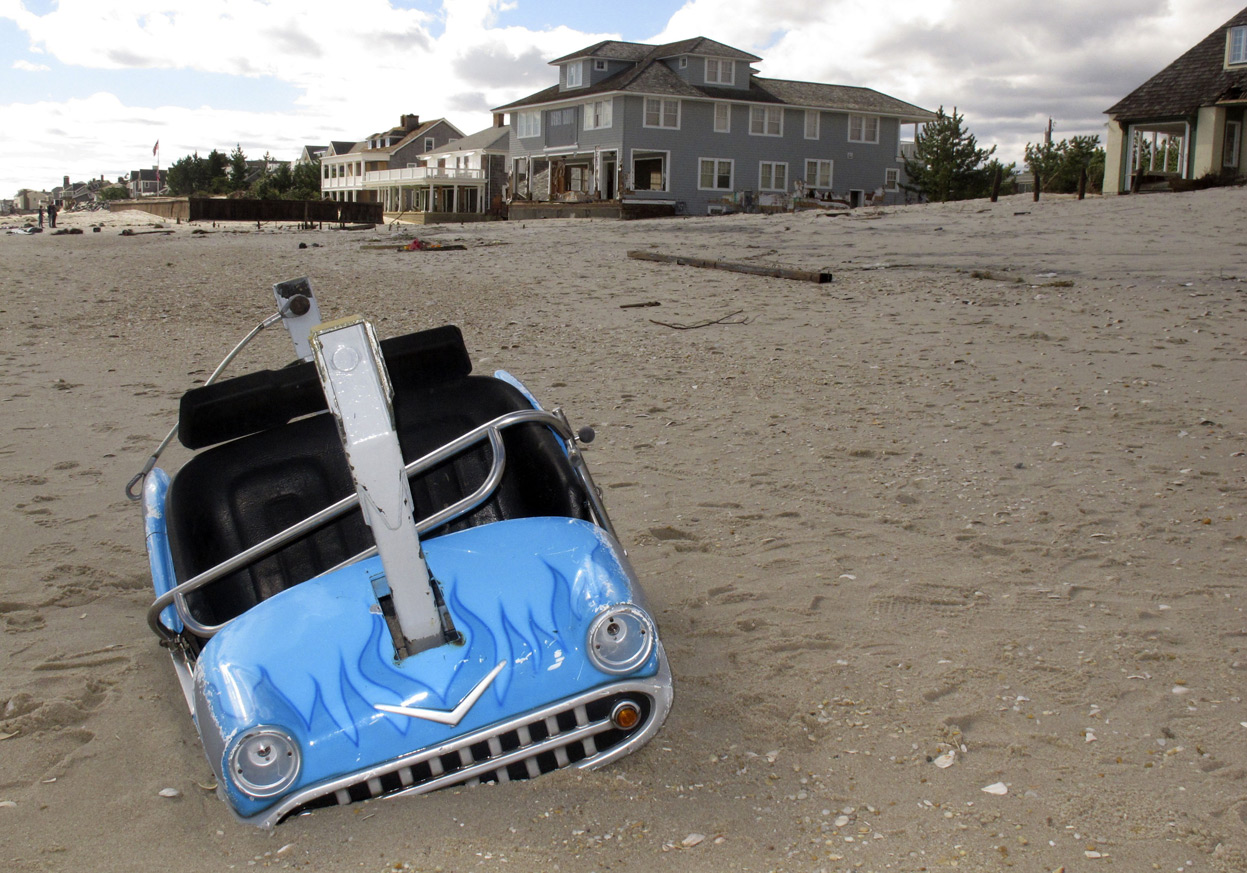
Fighting the last war wins nothing when the next war arrives and you've done little to get ready for it. Case in point: New Jersey and Governor Chris Christie's ongoing response to Super Storm Sandy.
In New Jersey too much of what is being done is totally last war. Fat with hubris and inappropriate slogans like "Stronger Than the Storm," real leadership in the state remains rare. A tough vision, one that frames adversity as the true driving force and mandates sacrifice, violates the status quo. Governor Christie talks like his voters can continue to thrive in the clear path of danger and escape unscathed, or at least until the 2015 presidential election, in which the governor seems to want to participate, as long as he acts tough and shows nature who's the boss of all that sand.
A year after Sandy, the window to do much different is closing. Decisions seem to be leading to a slow, indirect return to pre-Sandy conditions, with new defenses in place against storms and ocean surges. But few alter the facts:
• Rebuilding smashed communities and fortifying flooded towns returns them to harm's way, according to virtually all predictions about future hurricanes, storms, ocean surges and rising ocean levels.
• Policymakers continue to fight the last war and in doing so are ill-prepared for the next, not to mention facing the funding challenges in a protracted era of austerity.
• Governor Chris Christie, despite his boisterous swagger and occasionally commanding presence, is not a general on a mission but a politician who dances to the right, to the left, to the middle, with dreams of the White House in his sights.
But you can't saddle climate change with hubris and repeated rebuilds. Christie's leadership is that of a puppet of a political party with its head in the sand. Sadly, previous utterances from the shrinking fat man with high aspirations suggested he might be the big man the Jersey Shore, and even America, needed. Christie did seem smart enough, man-of-the-street enough, to mitigate future damages rather than stand on present ones.
It sounds heartless, and without compassion, such an assessment. It is not. Christie has demonstrated the tough love the circumstances demand, but lately had displaced it with chest beating and quick fixes — great media fodder. The energy, will, effort, money and planning going into rebuilding the Jersey Shore could be going into plans with legs. High legs, tall enough to replant people, homes, businesses above the inexorable rising sea. Compassion must be the lubrication for such a huge, ponderous, complex and hugely expensive effort, and will power the engine. Compassion and will power are the qualities of a strong governor and a good general, for that matter.
On the Jersey Shore, a unified vision to withstand a surging, energy-fed climate of storms and rising seas remains a pipe dream. An opportunity to accept that the enemy isn't Sandy, that nobody is stronger than the storms to come, ebbs away. Where is Springsteen with an empowering ballad about the Jersey Shore Freeze-Out? A song that hoists up a vision you can dance to? A song that struggles, fumbles and stirs the people of Jungleland to such a frenzy that the true work isn't passed along to our successors?
To save the Jersey Shore is to rethink its entire 150 mile, history-rich and future-promising length and make it live and sing and continue to be a balm for millions, as it has been in the past. Then just maybe, in 2050, 2075, there will be a Jersey Shore. One with a vast public seacoast of dunes, marshes, beaches, elevated communities and natural barriers, with the residential, business and other networks integrated into the protective web, rather than destroying it, as development has for decades. A public, bought-out, state-and-national effort accessible to all, 99.9 percent of the time.
A Mind Shift Needed
Storms have always been a reality on such a low-slung shore. For decades their relative infrequency helped locals, realtors, even insurance companies to forget that truth. But if scale changes everything, so does frequency. Add them together, meaner storms banging the coast more often, you've got climate change conditions as predicted.
A memorable blow, the Ash Wednesday Storm of March 1962 was "until recently, the worst storm in living memory to stroke the shore,"wrote John Seabrook in a July issue of The New Yorker. A local who lived through the storm said, "For those of us who have been here a long time, this is the demon we've lived with, and it was never a matter of if a storm of great magnitude would come, it was always a matter of when."
In August of 2011 Hurricane Irene could have taken out a large swath of the shore. Unpredictably, it went north and inland, flooding parts of Pennsylvania, upstate New York and Vermont, with record-high damages. A year later Sandy did what Irene failed to do. If Irene was a flurry of windy jabs and slapping seas, Sandy delivered the knock out punch in, as climate-change time goes, a fast follow up. Finishing the job.
Such fierce storms in relative succession are likely to be the norm. Irene and Sandy, one-after-the-other, are the forerunners of a difficult-to-predict continuum. One that can't be handled with plywood over windows, sand bags and all the heroes in the universe. You need to get out of the way.
Without a strong understanding of the nature and patterns of climate change in leaders like Chris Christie, state, regional and local officials right down to the guy hawking hot dogs on the boardwalk can't be expected to exert their own capacity for knowing what in hell is going on and what to do about it. When leaders don't lead, followers don't either. And wishful thinking, boastful declarations of hubris and quick fixes for iconic boardwalks, regardless of the resonance of their nostalgia, are leadership linked to short-term political life spans — two, four, sometimes eight years, rarely longer.
It's been almost four years since the climate experts from around the world met in Copenhagen, again hawking the unwanted, unheeded climate change words, "trends will accelerate, "abrupt or irreversible climate shifts," and so on. The forewarnings have been foregone. The indicators world wide have mostly been tossed to the wind.
We know better. Christie knows better. Climate change is a slow idea of inexorable power. It offers few of the easy, convenient solutions that Americans have come to expect from politicians. We have little recent evidence of our ability to embrace change that violates the way we've convinced ourselves life should be. Having our schemes and hopes broken is not something Americans care to hear. But hear it we must. Repeatedly. So we can talk about change as normal, as prolonged and inevitable, not short-termed with a return to the good old days. Who has the heart, the guts, the skill to make Americans understand, once again, the meaning of collective sacrifice? We'd rather be told we're stronger than the storm?
No way!
3 WAYS TO SHOW YOUR SUPPORT
- Log in to post comments













